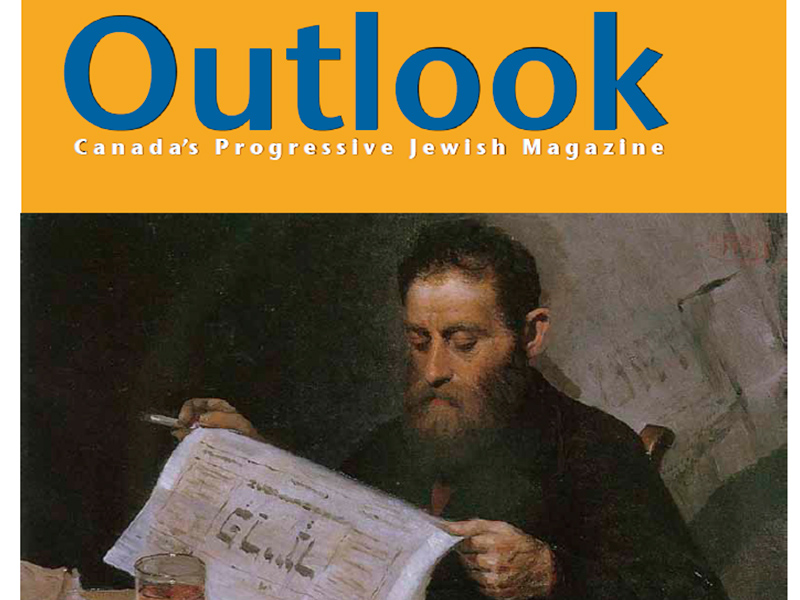The computers are gone. The desks have been cleared out. Old papers and letters and decades of paraphernalia have been removed or discarded.
The Vancouver office of Outlook: Canada’s Progressive Jewish Magazine has been vacated.
After more than 52 years in operation, Outlook has shut down. Subscribers received its farewell issue this month.
The publication grew out of the left-wing United Jewish Peoples Order (UJPO), a Canadian socialist political, cultural and educational organization founded in 1926.
During its heyday in the 1950s and ’60s UJPO had offices in Toronto, Montreal, Winnipeg and Vancouver and a membership of more than 2,000.
Outlook editor Carl Rosenberg said UJPO members made up the bulk of the magazine’s readership, but many of these people have died and the magazine did not attract younger readers.
He noted the irony of Outlook’s demise just as support for socialism has grown in the United States in response to Bernie Sanders’ candidacy for U.S. president.
At 52, Rosenberg is a generation or two younger than many Outlook readers. He said he was drawn to the publication – he discovered it in the mid ’80s – because it offered a variety of left-wing political views – socialist, Marxist, feminist and a dissenting voice on Israel.
He said at the height of its operation in the ’60s and ’70s, Outlook had 2,000 subscriptions, but the number dwindled to about 500 in recent years, and that wasn’t enough to sustain operations.
Indeed he and managing editor, Sylvia Friedman, ran the magazine on a minuscule budget, which meant low wages for both of them. Friedman, who had been with the magazine for 43 years, joked that she and Rosenberg would have to check the bank account before they cashed their paycheques. “We put the cheques away until the money came in,” she said.“I worked three days a week for $10 an hour. If you worked there, you had to be salaried elsewhere.”
It was very much a labour of love for Friedman, an octogenarian with a long history in Jewish progressive causes through decades of membership in UJPO.
She noted that the magazine was a proponent of Yiddish and arts and culture. It included book reviews and Yiddish poetry in every issue.
Outlook’s Yiddish component reflected the magazine’s roots as a supplement in The Vochenblatt, a Yiddish weekly newspaper published out of Toronto from 1940 to 1979.
The Outlook became an independent publication in 1963. Joshua Gershman, Vochenblatt’s publisher hired Friedman, then a Toronto resident, to work for Outlook in 1973. He was the de facto editor until his death in 1978. Much of her work at that time involved selling subscriptions.
In 1979, Friedman moved to Vancouver. She agreed to become managing editor and work with two progressive Jewish activists in Vancouver, Hank Rosenthal and Ben Chud, who shared the editorship.
In the late ’80s Outlook moved to an office at Vancouver’s Peretz Centre for Secular Jewish Culture, where Friedman is the rental manager.
Rosenberg began volunteering at Outlook in the ’80s. He was the assistant editor under Rosenthal, and after Rosenthal’s death in 1998, he became editor.
David Abramowitz has a 40-year history with UJPO and Outlook. His father, Albert, spearheaded the Toronto Outlook collective, which Abramowitz said raised funds to help publish Outlook. “It was always running on a shoestring.” He criticized its limited online presence, which he said could have been better developed to attract younger readers.
READ: SECULAR LEFT-WING JEWISH GROUPS TO GATHER FOR CONFERENCE AT YORK U
Martha Roth, a volunteer editor for 10 years, said there was no revenue from government or foundations. “The Outlook’s tone and mission was not congenial to various funding sources. It was too small or too radical.”
Roz Usiskin, a past president of the Winnipeg branch of UJPO and an UJPO member since 1945, called Outlook’s closure “ a loss for Canadian Jewry. We lost an alternate voice. That voice was so essential, especially at a time when we have such deep divisions in the Jewish community over the Israeli-Palestinian issue.”
